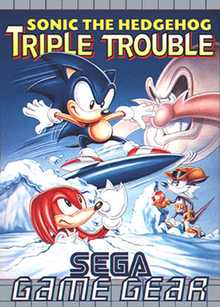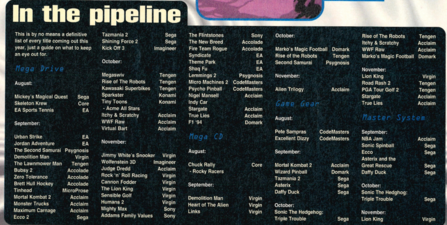Sonic Triple Trouble (lost Master System conversion of Sega Game Gear platformer; 1994): Difference between revisions
Cinnamon0999 (talk | contribs) (Created page with "{{InfoboxLost |title=<center>Sonic Triple Trouble SMS</center> |image= Sonicttgg.png |imagecaption=Box art of the Game Gear version of the game. |status=<span style="color:red...") |
No edit summary |
||
| (5 intermediate revisions by 3 users not shown) | |||
| Line 1: | Line 1: | ||
{{InfoboxLost | {{InfoboxLost | ||
|title=<center>Sonic Triple Trouble | |title=<center>Sonic Triple Trouble (Master System)</center> | ||
|image= Sonicttgg.png | |image= Sonicttgg.png | ||
|imagecaption=Box art of the Game Gear version of the game. | |imagecaption=Box art of the Game Gear version of the game. | ||
|status=<span style="color:red;">'''Lost'''</span> | |status=<span style="color:red;">'''Lost'''</span> | ||
}} | }} | ||
''Sonic Triple Trouble'' (known as ''Sonic and Tails 2'' in Japan) was a 1994 video game developed by Aspect and released for Sega's handheld video game system, the Game Gear. The game was a sequel to 1993's ''Sonic Chaos'' and was originally named ''Sonic Chaos 2'' (although this was likely a placeholder title).<ref>[https://archive.org/details/mean-machines-sega-magazine-20/page/n13/mode/2up Issue 20 of Mean Machines magazine where they confirm the name was originally ''Sonic Chaos 2''.] Retrieved 20 Aug '21</ref> The game, however, was '''originally planned to get a port to Sega's other 8-bit console, the Sega Master System''', a common practice for the ''Sonic'' handheld games. | |||
Sonic Triple Trouble (known as Sonic and Tails 2 in Japan) was a game released for Sega's handheld video game system the Game Gear | |||
==Background== | ==Background== | ||
In the | In the 90's, there were several ''Sonic the Hedgehog'' companion titles designed for Sega's two 8-Bit consoles (Game Gear and Master System). These would be designed for one of the systems and then converted over to the others. The Master System versions of these games would be released almost exclusively in Europe and Brazil as those were the markets where the Master System was successful and ''Sonic Triple Trouble'' was planned to be no different. | ||
==Development== | ==Development== | ||
Little is known about the development of the Master System version of Sonic Triple Trouble. No prototypes for this version exist. This is likely due to the conversion process only being done at the very end of development (as it is quite a simple process as both the Game Gear and Master System have almost identical hardware). Therefore, it is unknown if the conversion ever happened. It was likely cancelled late into the development of the Game Gear game. The last mention of the | Little is known about the development of the Master System version of ''Sonic Triple Trouble''. No prototypes for this version exist. This is likely due to the conversion process only being done at the very end of development (as it is quite a simple process as both the Game Gear and Master System have almost identical hardware). Therefore, it is unknown if the conversion ever happened. It was likely cancelled late into the development of the Game Gear game. The last mention of the Master System version was October, the month when the game came out.<ref>[https://archive.org/details/mean-machines-sega-magazine-24/page/n19/mode/2up Issue 24 of Mean Machines magazine where they confirm the Master System version was still coming out.] Retrieved 20 Aug '21</ref> | ||
==Gameplay== | ==Gameplay== | ||
Due to the nature of the game, being a direct conversion from the Game Gear to the Master System it would have likely contained all the features and levels as the Game Gear version of the game but with a bigger field of view. | Due to the nature of the game, being a direct conversion from the Game Gear to the Master System, it would have likely contained all the features and levels as the Game Gear version of the game, but with a bigger field of view. | ||
==Planned | ==Planned Release Date and Cancellation== | ||
The game was planned to be released alongside the Game Gear version in October of 1994<ref> [https://retrocdn.net/images/b/bc/SegaPower_UK_58.pdf Sega Power UK magazine where they confirm the game's release date]</ref> | The game was planned to be released alongside the Game Gear version in October of 1994.<ref>[https://retrocdn.net/images/b/bc/SegaPower_UK_58.pdf ''Sega Power UK'' magazine where they confirm the game's release date.] Retrieved 20 Aug '21</ref> It is unknown why it was cancelled. ''Sonic Triple Trouble'' recieved very little coverage in gaming magazines (usually only a paragraph) and an official reason for cancellation was never mentioned. This version of the game would have been exclusively released in Europe, as the Master System was considered a failure in the United States and Japan. | ||
==Gallery== | ==Gallery== | ||
<gallery mode=packed heights=150px> | <gallery mode=packed heights=150px> | ||
Sonicttsms1.png|Sega Power UK magazine's confirmation of the SMS' release date | Sonicttsms1.png|''Sega Power'' UK magazine's confirmation of the SMS' release date | ||
Sonicttsms2.png|Confirmation of the game's existence from Mean Machines magazine issue #20. | Sonicttsms2.png|Confirmation of the game's existence from ''Mean Machines'' magazine issue #20. | ||
Sonicttsms3.png|Confirmation that the SMS game was still planned from Mean Machine magazine issue #24. | Sonicttsms3.png|Confirmation that the SMS game was still planned from ''Mean Machine'' magazine issue #24. | ||
</gallery> | </gallery> | ||
==See | ==See Also== | ||
*[[Shadow the Hedgehog (lost build of unreleased Teen rated version of platformer; 2005)]] | *[[Shadow the Hedgehog (lost build of unreleased Teen rated version of platformer; 2005)]] | ||
*[[Sister Sonic (lost build of cancelled "Sonic the Hedgehog" localization of "Popful Mail" Sega CD side-scrolling platformer; 1993)]] | *[[Sister Sonic (lost build of cancelled "Sonic the Hedgehog" localization of "Popful Mail" Sega CD side-scrolling platformer; 1993)]] | ||
| Line 47: | Line 46: | ||
*[[Sonic The Hedgehog: Awakening (lost build of cancelled "Sonic the Hedgehog" game; existence unconfirmed; late 2000s)]] | *[[Sonic The Hedgehog: Awakening (lost build of cancelled "Sonic the Hedgehog" game; existence unconfirmed; late 2000s)]] | ||
*[[Sonic-16 (lost build of unreleased Sega Genesis/Mega Drive game based on "Sonic the Hedgehog" animated TV series; 1993)]] | *[[Sonic-16 (lost build of unreleased Sega Genesis/Mega Drive game based on "Sonic the Hedgehog" animated TV series; 1993)]] | ||
*[[Mario & Sonic at the Sochi 2014 Olympic Winter Games (Cancelled 3DS version of Wii U game; 2016; existence unconfirmed)]] | |||
==References== | ==References== | ||
Latest revision as of 03:17, 28 October 2021
Sonic Triple Trouble (known as Sonic and Tails 2 in Japan) was a 1994 video game developed by Aspect and released for Sega's handheld video game system, the Game Gear. The game was a sequel to 1993's Sonic Chaos and was originally named Sonic Chaos 2 (although this was likely a placeholder title).[1] The game, however, was originally planned to get a port to Sega's other 8-bit console, the Sega Master System, a common practice for the Sonic handheld games.
Background
In the 90's, there were several Sonic the Hedgehog companion titles designed for Sega's two 8-Bit consoles (Game Gear and Master System). These would be designed for one of the systems and then converted over to the others. The Master System versions of these games would be released almost exclusively in Europe and Brazil as those were the markets where the Master System was successful and Sonic Triple Trouble was planned to be no different.
Development
Little is known about the development of the Master System version of Sonic Triple Trouble. No prototypes for this version exist. This is likely due to the conversion process only being done at the very end of development (as it is quite a simple process as both the Game Gear and Master System have almost identical hardware). Therefore, it is unknown if the conversion ever happened. It was likely cancelled late into the development of the Game Gear game. The last mention of the Master System version was October, the month when the game came out.[2]
Gameplay
Due to the nature of the game, being a direct conversion from the Game Gear to the Master System, it would have likely contained all the features and levels as the Game Gear version of the game, but with a bigger field of view.
Planned Release Date and Cancellation
The game was planned to be released alongside the Game Gear version in October of 1994.[3] It is unknown why it was cancelled. Sonic Triple Trouble recieved very little coverage in gaming magazines (usually only a paragraph) and an official reason for cancellation was never mentioned. This version of the game would have been exclusively released in Europe, as the Master System was considered a failure in the United States and Japan.
Gallery
See Also
- Shadow the Hedgehog (lost build of unreleased Teen rated version of platformer; 2005)
- Sister Sonic (lost build of cancelled "Sonic the Hedgehog" localization of "Popful Mail" Sega CD side-scrolling platformer; 1993)
- Sonic 3D Blast (found cassette demo tape of unused game soundtrack; 1996)
- Sonic Adventure New Year's DLC (found "Sonic the Hedgehog" holiday-themed DLC; 1998)
- Sonic at the Olympic Winter Games (found iOS game; 2010)
- Sonic DS (lost Nintendo DS tech demo; 2004)
- Sonic Generations (lost game demo; 2010)
- Sonic Jr. (lost build of unreleased Sega Pico game; existence unconfirmed; 1994)
- Sonic Saturn (lost build of cancelled Sega Saturn prototype of platformer; mid-1990s)
- Sonic Sports (lost build of cancelled Sega 32X sports game; 1995)
- Sonic Synergy (lost original build of "Sonic Boom: Rise of Lyric" Wii U action-adventure game; 2007-2013)
- Sonic the Hedgehog "2006" (lost complete build of Xbox 360/PlayStation 3 platformer; 2006)
- Sonic the Hedgehog (lost build of cancelled Amiga port of Sega Genesis platformer; 1992)
- Sonic The Hedgehog (lost build of cancelled Sega CD port of Sega Genesis platformer; 1992)
- Sonic the Hedgehog (lost Tokyo Toy Show prototype build of Sega Genesis/Mega Drive platformer; 1990)
- Sonic the Hedgehog (lost Winter Consumer Electronics Show 1991 demo build of Sega Genesis/Mega Drive platformer; 1991)
- Sonic The Hedgehog 3 & Knuckles (lost build of cancelled iOS port of Sega Genesis platformers; 2014)
- Sonic The Hedgehog: Awakening (lost build of cancelled "Sonic the Hedgehog" game; existence unconfirmed; late 2000s)
- Sonic-16 (lost build of unreleased Sega Genesis/Mega Drive game based on "Sonic the Hedgehog" animated TV series; 1993)
- Mario & Sonic at the Sochi 2014 Olympic Winter Games (Cancelled 3DS version of Wii U game; 2016; existence unconfirmed)
References
- ↑ Issue 20 of Mean Machines magazine where they confirm the name was originally Sonic Chaos 2. Retrieved 20 Aug '21
- ↑ Issue 24 of Mean Machines magazine where they confirm the Master System version was still coming out. Retrieved 20 Aug '21
- ↑ Sega Power UK magazine where they confirm the game's release date. Retrieved 20 Aug '21



